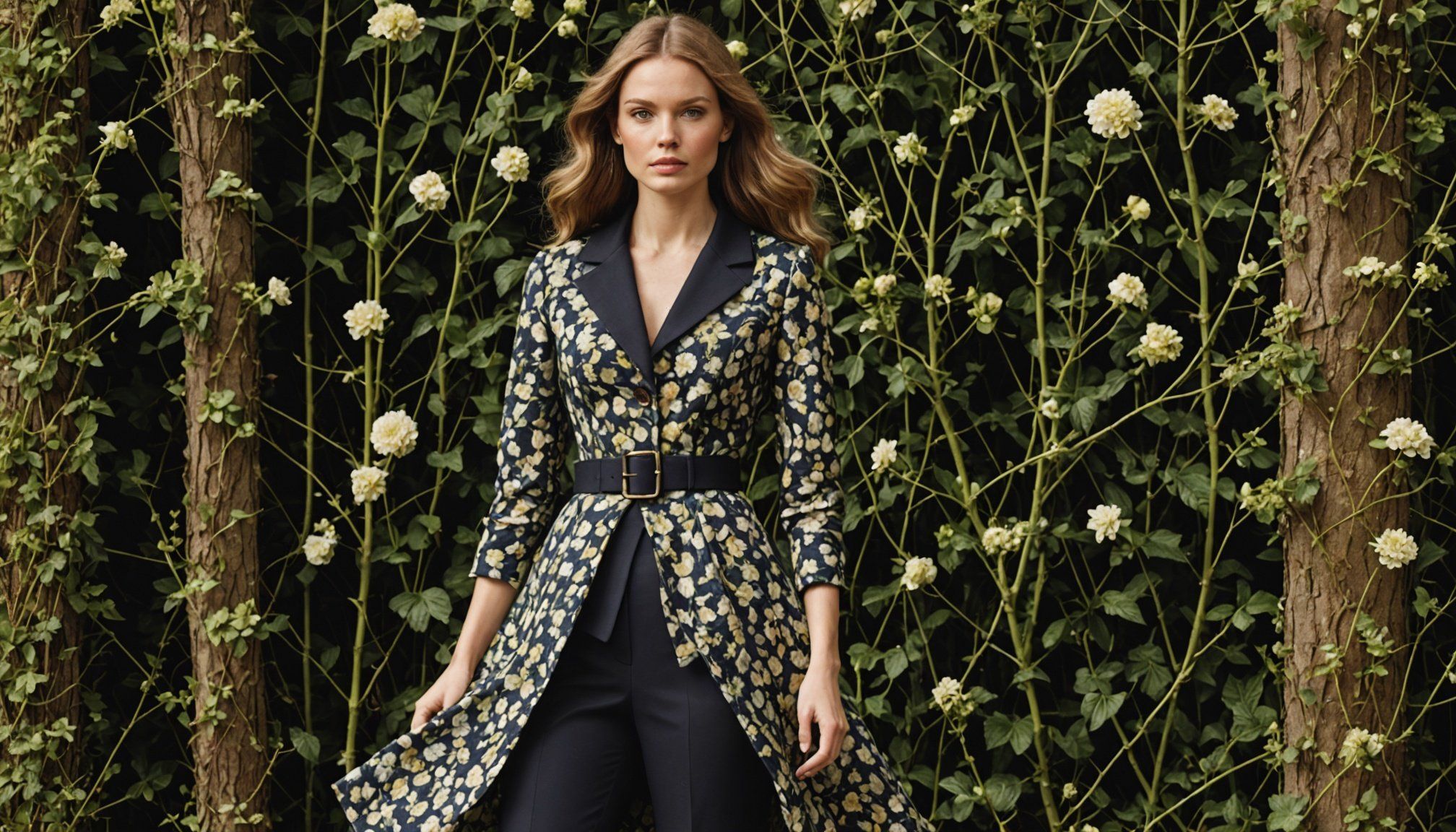Overview of Innovative Textile Advancements
The textile industry is currently witnessing remarkable transformations that are reshaping women’s fashion. Key textile technologies are driving this evolution by integrating innovative approaches that significantly enhance style, comfort, and sustainability. Central to these advancements are developments in smart textiles, sustainable materials, and biodegradable options.
In the UK fashion scene, these technologies are making waves, with numerous designers and brands adopting them to create cutting-edge fashion. For instance, smart textiles with temperature control and moisture-wicking properties are being incorporated into activewear, significantly enhancing performance and comfort. Moreover, sustainable textiles such as recycled polyester and organic cotton are being utilised to reduce environmental impact, aligning with the growing consumer demand for eco-friendly products.
Also read : Elevate your edinburgh style: trendy tips for rocking a victorian bustle skirt
Textile innovations play a crucial role in maintaining a competitive edge in the fierce fashion industry. Designers and brands that embrace these advances not only appeal to environmentally conscious consumers but also position themselves as leaders in technological integration within fashion. This constant push for innovation helps them stay relevant, competitive, and financially successful in an ever-evolving market. Hence, textile innovation is not just a trend but a fundamental aspect of the modern fashion industry.
Key Innovative Materials in Women’s Fashion
The fashion industry’s drive towards sustainable textiles is revolutionising women’s fashion. Organic cotton, hemp, and bamboo have surged in popularity due to their low environmental impact and eco-friendly properties. Hemp, for instance, requires less water than conventional cotton, making it a greener choice for producing garments. Additionally, recycled materials, such as polyester made from plastic bottles, contribute significantly to reducing waste and promoting a circular fashion economy.
Also read : Essential Factors for Selecting Ethical Artisan Footwear in the UK: A Comprehensive Guide
Several forward-thinking brands are at the forefront of using innovative materials. These include companies like Stella McCartney and People Tree, renowned for their commitment to sustainability. Their collections showcase an array of garments made from organic and recycled textiles, exemplifying industry-leading eco-friendly practices.
In parallel, smart textiles integrate technology into fabric, amplifying clothing functionality. Moisture-wicking and temperature control features are transforming traditional wear into performance-enhancing apparel. Brands like Lululemon are utilising these advancements, embedding smart textiles into everyday clothing, thereby appealing to consumer demands for both comfort and style.
Furthermore, biodegradable and compostable fabrics are emerging, addressing fashion’s waste issue. Designers such as Eileen Fisher are championing these innovations, integrating materials that break down naturally, reinforcing the sustainable momentum within women’s fashion.
Sustainability’s Role in Textile Advancements
In recent years, fashion sustainability has become a pivotal factor in women’s fashion, driven largely by consumers who prioritise eco-friendly practices. Innovative textiles play a significant role in this landscape, enabling brands to adhere to sustainable practices while creating stylish apparel. Fabrics like organic cotton, which require fewer pesticides and less water, and recycled materials, which minimise waste, are at the forefront of this movement.
The integration of these textiles not only reduces environmental impact but also caters to the rising demand for sustainable options. Brands committed to these advancements see positive consumer reception, as increasingly eco-conscious buyers seek out clothing that aligns with their values.
Furthermore, the future implications of this trend indicate a likely increase in the adoption of sustainable practices across the fashion industry. As more brands incorporate innovative textiles, the industry’s approach to sustainability will continue to evolve, leading to a shift in consumer behaviour.
Consumers are progressively considering the environmental footprint of their fashion choices, suggesting that the market for sustainable fashion will expand. This momentum underscores the importance of ongoing innovation in textile technology to meet future demands.
Design Trends Emerging from Textile Innovations
Exploring the influence of innovative textiles on fashion design trends reveals significant aesthetic shifts. New fabrics and textures enable designers to experiment with unique looks, evolving fashion aesthetics. Many garments now boast futuristic designs due to advanced textile features like innovative smart textiles. Designers must balance integrating new materials with maintaining traditional aesthetics, a challenge that has yielded stunning results.
Fashion customization through technology is also transforming the industry, allowing for highly personalized fashion experiences. Advanced textiles integrate with consumer preferences, facilitating customized garments that match individual styles. Brands like Burberry and Nike are successfully merging design with technology, offering tailored fashion solutions. This strategy not only enhances consumer satisfaction but also strengthens brand loyalty.
In the realm of fashion shows and retail, showcasing these advancements has evolved significantly. Runway trends now prominently feature pieces made from cutting-edge textiles, drawing attention to technological integration. Additionally, retail experiences are shifting to offer tech-driven textiles as key components of the shopping journey. As brands adapt to these changes, the way consumers engage with fashion is set to redefine traditional shopping experiences, ushering in a new era of interactive and personalized retail.
Impacts of Innovative Textiles on the UK Fashion Industry
The fusion of innovative textiles into the UK fashion industry is leading to significant market evolution. Textile advancements are reshaping how fashion brands operate and compete, emphasising eco-friendliness and technological enhancement. In particular, the integration of smart textiles, like those with moisture-wicking and temperature regulation properties, is enhancing garment functionality, appealing directly to modern consumer preferences.
Economically, these innovations are redefining competitiveness. Brands seizing the opportunity to incorporate advanced textiles are seeing improved market standings. They are viewed as pioneers in a crowded fashion landscape, providing them with a notable edge. These developments not only attract savvy consumers but also foster brand loyalty by aligning with the values of sustainability and practicality.
In terms of long-term perspectives, the UK’s fashion market will likely continue embracing these advancements to sustain competitiveness globally. As consumers become more discerning and eco-conscious, the demand for cutting-edge materials that address both style and environmental concerns will surge. This shift is poised to set brands apart, influencing purchasing decisions and cementing a brand’s reputation as forward-thinking within the industry. The result is a more dynamic, innovative fashion landscape that keeps pace with consumer expectations.
Design Trends Emerging from Textile Innovations
Innovative textiles are propelling significant aesthetic shifts in women’s fashion. The introduction of unique textures and materials has unlocked new avenues for creativity, allowing designers to forge futuristic styles. This shift sparks experimentation with bold patterns and sleek silhouettes, creating garments that reflect both tradition and innovation.
Designers face the challenge of weaving new materials into their collections without compromising classic aesthetics. However, integrating innovative textiles with traditional designs has led to captivating results, celebrated on runways worldwide. The balance between old and new keeps fashion design trends both refreshing and nostalgic.
Moreover, technology has revolutionised fashion customisation, offering tailored experiences for every individual. Textiles now respond to consumer preferences, embodying their personal styles through tailored garment production. Brands such as Burberry and Nike excel in merging design with technology, delivering bespoke fashion solutions that enhance customer engagement.
The incorporation of tech-driven textiles further transforms retail spaces. Modern fashion shows feature cutting-edge textiles, luring attention with their technological prowess. This evolution extends to retail, where an emphasis on interactive experiences shifts shopping dynamics. As technology and fashion converge, consumer engagement evolves, heralding a new era of personalised, tech-savvy fashion consumption.








